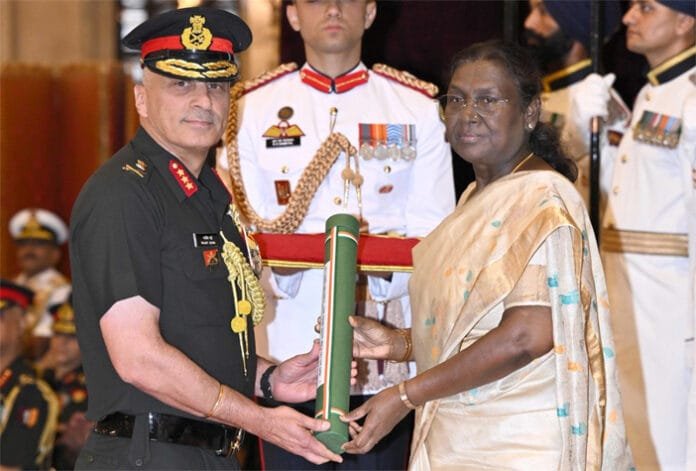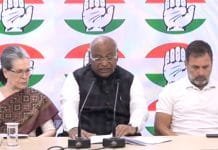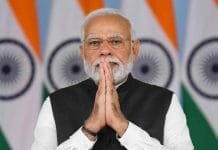INVC NEWS
New Delhi — : In a major reshuffle within the Indian Army, Lieutenant General Rajiv Ghai, the distinguished military strategist who became the public face of Operation Sindoor, has been promoted to the prestigious position of Deputy Chief of Army Staff (Strategy). This elevation is not just a recognition of his operational brilliance, but also a step that places him at the helm of India’s strategic military planning and operational oversight.
A Strategic Promotion: All Operational Wings Now Under His Command
The elevation of Lt Gen Rajiv Ghai to this critical role means that all operational verticals of the Indian Army will now report to him. This includes frontline tactical units, joint operational commands, and sensitive mission-oriented wings that deal with counter-terrorism, surgical strikes, and high-intensity border skirmishes. His new post empowers him to directly influence India’s defensive posture and proactive strategic operations across both the western and northern frontiers.
This move comes at a time when India’s defense landscape is evolving rapidly with the introduction of next-gen warfare technologies, high-tech surveillance, and enhanced cross-border response capabilities.
Continued Role as DGMO: Dual Command Reflects Supreme Confidence
In a rare but telling gesture of trust, Lt Gen Rajiv Ghai will also retain his charge as the Director General of Military Operations (DGMO). Holding both positions simultaneously puts him in a unique command position, centralizing operational execution and strategic planning under a single authoritative figure.
The Army’s confidence in his leadership was further solidified last week when he was awarded the prestigious Uttam Yudh Seva Medal (UYSM) for his exemplary role in Operation Sindoor. This dual responsibility is a powerful acknowledgment of his capability to handle complex, multi-theatre military operations with precision and speed.
Operation Sindoor: A Landmark Military Success Under His Command
Lt Gen Ghai came into the national and international spotlight following Operation Sindoor, a daring and meticulously coordinated military operation that targeted and eliminated 9 major terrorist hideouts deep inside Pakistan and Pakistan-occupied Kashmir (PoK).
During a press conference held on May 11, a day after the official ceasefire, Lt Gen Ghai stated that the operation was executed with surgical accuracy following extensive surveillance and intelligence inputs. He confirmed that over 100 terrorists were neutralized, including some of the most dangerous and high-value militants linked to major attacks on Indian soil.
Among the eliminated were:
Abdul Malik Rauf – linked to the IC-814 hijacking
Yusuf Azhar – a known Jaish-e-Mohammed commander
Mudassir Ahmed – one of the masterminds of the Pulwama attack
Their elimination marks a strategic and psychological victory for the Indian Armed Forces, underscoring the operational excellence and intelligence synergy achieved under Lt Gen Ghai’s command.
A Voice of Confidence and Clarity During Crisis
Lt Gen Ghai’s clear, composed, and confident public communication during the Operation Sindoor press briefings captured national attention. His calm demeanor while revealing the high-stakes details of cross-border engagements reassured citizens and conveyed a message of operational superiority and strategic restraint.
His statement, “I have no doubt that we completely surprised them with our attack,” emphasized India’s ability to conduct covert intelligence operations followed by pinpoint military action, showcasing a new era of assertive defense doctrine.
COAS General Upendra Dwivedi Lauds Operation Sindoor’s Impact
Chief of Army Staff General Upendra Dwivedi, commenting on the success of Operation Sindoor, described it as not merely a military maneuver, but a bold national assertion. He highlighted how the operation reflected India’s unity, strategic resolve, and technological superiority in modern warfare.
He said, “Operation Sindoor was not just a military response; it was also an expression of India’s unity, resolve, and confidence. The government gave us complete strategic freedom and the trust shown by the countrymen became our source of inspiration.”
This endorsement from the highest military authority reinforces Lt Gen Ghai’s strategic value to the Army and the nation.
A Rising Star in India’s Military Leadership
Lt Gen Rajiv Ghai is part of a new generation of Indian military leaders who are tech-savvy, strategically agile, and capable of multi-domain warfare execution. His previous postings in operationally sensitive zones, combined with his current dual roles, have equipped him with 360-degree insight into India’s defense framework.
He has been instrumental in transforming real-time battlefield intelligence into actionable strike missions. His decisions are characterized by quick strategic calculations, operational depth, and zero tolerance for cross-border threats.
Significance of the Deputy Chief of Army Staff (Strategy) Role
The role of the Deputy Chief (Strategy) is pivotal. It serves as the bridge between strategic planning and field operations, ensuring that India’s military doctrine evolves dynamically to counter emerging threats, including hybrid warfare, cyber assaults, and irregular conflict strategies employed by adversaries.
As Lt Gen Ghai assumes this expanded command, the Indian Army is expected to witness:
More synchronized cross-theatre coordination
Enhanced intelligence-action integration
Rapid strike capability upgrades
Heightened focus on eastern and western border contingencies
India’s Next Steps: From Operation Sindoor to Strategic Deterrence
With Lt Gen Ghai now playing a central role in shaping India’s offensive and defensive military responses, analysts expect a continued hardline stance against terrorism across the Line of Control (LoC). Operation Sindoor is likely just the beginning of a series of preemptive and retaliatory strategies.
Given his involvement in both operational briefings and on-ground strategy, his influence over future operations will be critical in maintaining India’s deterrence posture against state-sponsored terrorism.
















